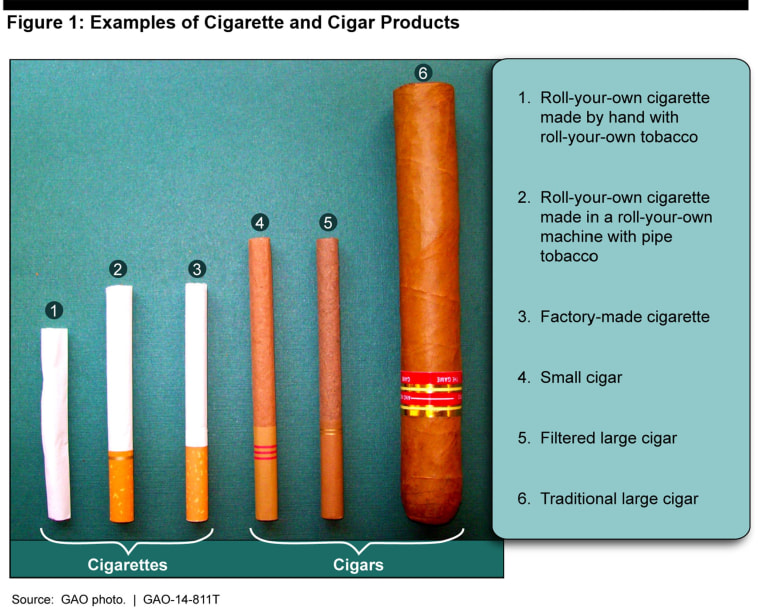A 2009 law that raised federal taxes on tobacco products to discourage smoking triggered a market shift to pipe tobacco and large cigars, costing the U.S. Treasury billions in lost revenue, according to a GAO report obtained by NBC News. In some instances, it took little more than a label change to qualify for the lower tax rate, it said.
The Government Accountability Office study, which will be the focus of a congressional hearing on Tuesday, found that Children’s Health Insurance Program Reauthorization Act (CHIPRA) drove manufacturers and price-conscious consumers to gravitate to pipe tobacco and so-called large cigars because it taxed them at lower rates than cigarettes, small cigars and roll-your-own tobacco.
Among what the report labeled “tax avoidance” measures were reclassifying roll-your-own tobacco as pipe tobacco, “with minimal differences in the packaging and the appearance of the tobacco itself,” and slightly increasing the weight of so-called small cigars to qualify for the lower large-cigar tax rate.

The changes translated to a loss of between $2.6 billion and $3.7 billion in federal taxes from April 2009 through February 2014, the GAO found. By comparison, the U.S. Treasury collected about $77 billion in tobacco product taxes over the same period, it said.
"This is a classic case of tax evasion that's being fueled by a lapse in good government," said Senate Finance Committee Chairman Ron Wyden, D-Ore, who will chair Tuesday’s hearing. "As a result, the country has taken a hit worth billions of dollars, and children and teens have easier access to tobacco. It's time for the Senate Finance Committee to look at solutions to close this loophole for good."
In a statement provided to NBC News, the Altria Group, parent company of tobacco manufacturer Philip Morris, said it endorses calls to equalize the tax rate for different products, saying that "little cigars and roll-your-own tobacco should pay the same tax as cigarettes, as Congress intended. "
It also stated that "our companies do not make little cigars or RYO (roll-your-own) tobacco and have not changed our products to fit into different tax classifications."
Bryan D. Hatchell, a spokesman for R.J. Reynolds Tobacco Co., said, “Once the report is issued, we look forward to reviewing it and seeing what policy recommendations the GAO presents to effectively deal with this problem.”
Bob Bannon, director of investor relations with the Lorrilard tobacco company, declined to comment on the GAO report.
The report noted that while CHIPRA raised tax rates on all types of tobacco products, it raised the rate on pipe tobacco and large cigars by a lesser amount, creating a substantial tax disparity easily visible to consumers.
In the case of loose tobacco for use in pipes or rolling machines, the change resulted in a tax differential of $21.95 per pound in favor of pipe tobacco – a big incentive for price-conscious smokers to alter their buying behavior. For example, GAO investigators who visited a Washington, D.C., smoke shop in April purchased a 6-ounce bag of pipe tobacco for $13.77, while a same-size bag of roll-your-own tobacco cost $26.49.
For cigars, the determination of whether they are considered “small” or “large” for purposes of taxation is determined only by weight – with anything above 3 pounds per 1,000 considered large. That enabled manufacturers of small cigars, which resemble cigarettes but are wrapped in tobacco leaves, to qualify for the lower tax rate by making their products slightly heavier, in some cases by packing the tobacco more tightly. Some manufacturers also changed their labels from “small cigars” to “filtered cigars” or simply “cigars,” while often continuing with the same packaging and design, the report said.
Direct comparisons between cigar tax rates are more difficult to calculate, as small cigars are taxed at a rate of $50.33 per thousand sticks – the same rate as cigarettes – while large cigars are taxed at a rate of 52.75 percent of the manufacturer’s or importer’s sale price. But the GAO said a manufacturer of cigars costing $50 per thousand would realize a tax savings of $23.95 per thousand by qualifying the product as large.
Follow NBC News Investigations on Twitter and Facebook.
It also noted that the change had an immediate impact on the tobacco marketplace, with total annual sales of large cigars growing from about 5.8 billion in fiscal 2008 to more than 12.4 billion in fiscal 2013 – an increase of about 115 percent. That surge also was reflected in an 88 percent decline in small cigar sales over the same period, it said.
The GAO did not issue any formal recommendations in its report, but indicated it stood by its previous recommendation that Congress consider equalizing tax rates to reduce or eliminate the differentials.
